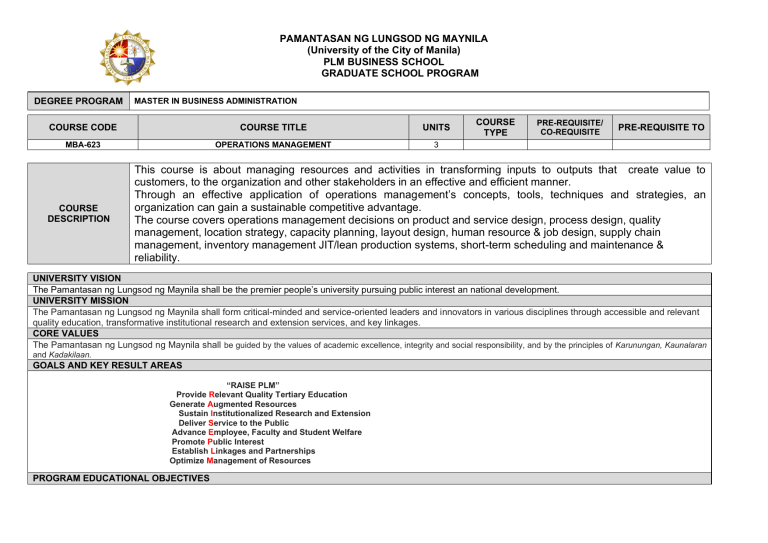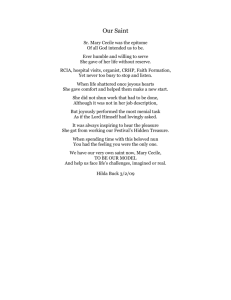
PAMANTASAN NG LUNGSOD NG MAYNILA (University of the City of Manila) PLM BUSINESS SCHOOL GRADUATE SCHOOL PROGRAM DEGREE PROGRAM MASTER IN BUSINESS ADMINISTRATION COURSE CODE COURSE TITLE UNITS MBA-623 OPERATIONS MANAGEMENT 3 COURSE DESCRIPTION COURSE TYPE PRE-REQUISITE/ CO-REQUISITE PRE-REQUISITE TO This course is about managing resources and activities in transforming inputs to outputs that create value to customers, to the organization and other stakeholders in an effective and efficient manner. Through an effective application of operations management’s concepts, tools, techniques and strategies, an organization can gain a sustainable competitive advantage. The course covers operations management decisions on product and service design, process design, quality management, location strategy, capacity planning, layout design, human resource & job design, supply chain management, inventory management JIT/lean production systems, short-term scheduling and maintenance & reliability. UNIVERSITY VISION The Pamantasan ng Lungsod ng Maynila shall be the premier people’s university pursuing public interest an national development. UNIVERSITY MISSION The Pamantasan ng Lungsod ng Maynila shall form critical-minded and service-oriented leaders and innovators in various disciplines through accessible and relevant quality education, transformative institutional research and extension services, and key linkages. CORE VALUES The Pamantasan ng Lungsod ng Maynila shall be guided by the values of academic excellence, integrity and social responsibility, and by the principles of Karunungan, Kaunalaran and Kadakilaan. GOALS AND KEY RESULT AREAS “RAISE PLM” Provide Relevant Quality Tertiary Education Generate Augmented Resources Sustain Institutionalized Research and Extension Deliver Service to the Public Advance Employee, Faculty and Student Welfare Promote Public Interest Establish Linkages and Partnerships Optimize Management of Resources PROGRAM EDUCATIONAL OBJECTIVES Graduates of Master in Business Administration are expected to: • Develop business competencies necessary to design and implement strategies to improve overall organizational results taking into consideration the ethical and international issues of the business environment. • Enhance competencies in problem analysis and resolution, team management, performance management, communication and interpersonal skills and project management. • Equip students with theoretical and practical knowledge which can benefit tremendously in managerial and administrative jobs. PROGRAM OUTCOMES A graduate of the Master in Business Administration program must: a. Perform highest level of work quality b. Convey ideas clearly both in oral and written English. c. Apply the principles of the different forms of communication. d. Conduct feasibility study, business research and business plans. e. Apply the concepts and principles of good interpersonal relations. f. Prepare, analyze, and evaluate reports, proposals, and concept papers. g. Demonstrate leadership qualities, civic mindedness, and responsible citizenship. h. Conduct environmental scanning in preparation for strategic and feasibility plans. i. Explain the concepts, approaches and techniques of environmental conservation. j. Participate actively in business associations and comply with their policies and obligations. k. Develop a strong personality that demonstrate firm leadership and decision-making ability. l. Develop the ability to access, retrieve and disseminate information using Information Technology (IT). m. Know and understand the country’s national development thrusts, concerns and socio-economic indicators. n. Demonstrate the values of fairness, transparency, accountability, hard work, honesty, patience, diligence, innovativeness, and risk taking 2 | PLM/BUSINESS SCHOOL/GRADUATE PROGRAM / MBA/ OPERATIONS MANAGEMENT/Cecile Santiago, DBA, RCh.E Session Week1 Introduction to Operations Management No. Of Hours 3.5 hours Week 2 Learning Objectives The learners shall be able to: 1. Understand and comply with the course requirements in order to pass. 2. Discuss OM terms; 3. Compare and contrast services and manufacturing operations; 4. Discuss the key aspects of operations management in decision making. 5. Fully grasp the importance of the role of Operations Management in any organization. 6. Identify the current challenges in OM 7. Describe the relationship among the three major functional areas of an organization; 8. Explain how business organizations gain competitive advantage in operations 9. Discuss strategy and its connection with the company’s objectives, mission and vision statements. 1. 3.5 hours 2. 3.5 hours 1. Solve problems on partial and multi-factor productivity; Relate productivity with competitiveness; Review OM Tools: Project Management Topics for Discussion 1. Introduction of Students 2. House Rules 3. Discussion of Course Coverage, Course Outline and Course Requirements 4. Introduction to the Course 5. Developing Strategies 6. Gaining Competitive Advantage Through OM 7. Assignment of Topic 1. Productivity Methodology Synchronous & Asynchronous in All sessions Interactive Discussion 1. 2. Project Management Lecture Interactive Discussion Problem Solving Assignment Concept Application – (Case) Assignment Read Supplementary Resources Required Readings Participation in the Discussion Assignment of Topic for Research and Schedule of Presentation 3. 4. 1. Assessment/ Evaluation Quiz Heyl, J. (2014). Operations and Productivity.Retrieved from http://cbafaculty.org/Operati ons_Management/hr_om11 _ch02.ppt Required Readings Heyl, J. (2014). Operations and Productivity.Retrieved from hhttp://homes.ieu.edu.tr/stu nali/courses/ch1_om.ppt Quiz 3 | PLM/BUSINESS SCHOOL/GRADUATE PROGRAM / MBA/ OPERATIONS MANAGEMENT/Cecile Santiago, DBA, RCh.E Session Week 4 Arielle No. Of Hours 3.5 hours Learning Objectives Topics for Discussion The learners shall be able to: 2. Review OM Tools: Forecasting 2. 1. 2. 3. 4. 5. 6. 7. 8. Week 3 Neil 3.5 hours 1. 2. 3. 4. Use terms properly; List some reasons for designing or redesigning products; Discuss the objectives of product design Discuss the importance of legal, ethical and environmental issue in product design; Describe the phases in product design and development; Identify some sources of design ideas; Discuss the issues and challenges in service design; Apply Techniques like Decision Tree Analysis and Decision Making Relate the importance of quality management with competitiveness of a firm; Discuss the different elements of TQM; Apply the different tools of TQM; Apply SPC; 3.5 hours 1. 2. Explain the strategic importance of process selection; Explain how process selection affect the 1. 1. 2. 3. 4. 5. Product Strategies Product Life Cycles Product-by-Value Analysis Product Development Techniques that are important to the design of a product 6. Defining the Product 7. Documents for Production 8. Service Design 9. Documents for Services 10. Application of Decision Trees to Product Design Transition to Production 11. Assignment for Next Week 2. Managing Quality & SPC 1. 1. 2. 2. 3. 4. 5. 6. Definition & Implications of Quality Cost of Quality International Quality Standards Total Quality Management Tools of TQM Statistical Process Control (SPC) Role of Inspection Process Strategy 2. 3. Assessment/ Evaluation Supplementary Resources Forecasting 3. Assignment for Next Week Design of Goods & Services 7. Week 4 Darling Methodology 1. Process Strategies Process Analysis & Design Service Process Design 3. 3. 1. 2. Student Presentation Interactive Discussion Assignment Concept Application – (Case) 1. Student Presentation Interactive Discussion Assignment: Concept Application – (Case) 1. 2. 3. Student Presentation Assignment Participation Student Presentation Interactive Discussion 1. 2. 3. 4. Presentation Participation Quiz Assignment 2. 3. Student Presentation Assignment Participation 4 | PLM/BUSINESS SCHOOL/GRADUATE PROGRAM / MBA/ OPERATIONS MANAGEMENT/Cecile Santiago, DBA, RCh.E Session No. Of Hours Week 5 Sauro Week 5 Sauro 3.5 hours Learning Objectives The learners shall be able to: organization; 3. Compare and contrast the different processing types; 4. Discuss automated approaches to processing; 5. Explain the need for management of technology; 6. Apply the concepts learned. 1. Explain why some organizations make location decisions; 2. Explain the importance of location decisions; 3. Discuss the options that are available for location decisions; 4. Explain why some organizations make location decisions; 5. Explain the importance of location decisions; 6. Discuss the options that are available for location decisions; 7. Outline the decision process for location decisions; 8. Use the techniques presented to solve typical problems. 1. Explain the importance of capacity planning; 2. Discuss ways of defining and measuring capacity; 3. Describe the major determinants of effective capacity; 4. Discuss the major considerations related to developing capacity alternatives; 5. Apply Tools like Topics for Discussion 4. 5. Selection of Equipment & Technology Technology in Services Methodology 3. Assignment: Concept Application – (Case) 1. Student 1. Presentation Interactive 2. Discussion 3. Problem Solving 4. Assignment Assessment/ Evaluation Supplementary Resources Location Strategies 1. 2. 3. 4. 5. Importance of Location Decisions Factors that Affect Location Decisions Methods of Evaluating Location Alternatives Service Location Strategy Assignment for Next Week Capacity Planning 1. 2. 3. 4. 5. 6. Design & Effective Capacity 2. Considerations for a good capacity decision 3. Managing Demand 4. Capacity Planning Break-Even Analysis Application of Decision Trees to Capacity Decisions Student Presentation Assignment Quiz Participation 5 | PLM/BUSINESS SCHOOL/GRADUATE PROGRAM / MBA/ OPERATIONS MANAGEMENT/Cecile Santiago, DBA, RCh.E Session No. Of Hours Week 6 Michelle Learning Objectives Topics for Discussion The learners shall be able to: Forecasting, Decision Tree Analysis and Decision Making; 6. Apply the approaches that are useful for evaluating capacity alternatives. 1. Explain some reasons for the redesign of layout; 2. Compare and contrast the basic layout types; 3. Solve simple line balancing problems; 4. Create simple process layouts. Layout Strategies 1. 2. 3. 4. 5. 6. 7. 8. 9. Week 7 Rafael 3.5 hours 1. 2. 3. 4. 5. 6. 7. 8. Explain the importance of work design Describe the approaches to job design; Explain the term knowledge-based pay; Explain the purpose of methods analysis and describe how methods studies are performed. Describe four commonly used techniques for motion study; Discuss the impact of working conditions on job design; Define a standard time; Describe and compare time study methods and perform calculations; 2. 3. 4. 5. 6. 7. 8. Assessment/ Evaluation Supplementary Resources Importance of Layout Decisions Office Layout and Retail Layout Warehouse and Storage Layouts Fixed Position Layout Process-Oriented Layout Work Cells (Requirements, Staffing, Balancing) Repetitive and ProductOriented Layout Assembly line balancing Assignment for Next Week Human Resource, Job Design& Work Measurements 1. Methodology 1. 2. Human Resource Strategy for competitive advantage 3. Labor Planning Job Design Ergonomics and the Work Environment The Visual Workplace Labor Standards Ethics Assignment for Next Week Student Presentation Interactive Discussion Assignment 1. 2. 3. Student Presentation Assignment Participation 6 | PLM/BUSINESS SCHOOL/GRADUATE PROGRAM / MBA/ OPERATIONS MANAGEMENT/Cecile Santiago, DBA, RCh.E Session Week 8 Week 9 Katherine No. Of Hours 3.5 hours Learning Objectives The learners shall be able to: 9. Describe work sampling and perform calculations; 10. Compare stopwatch time study and work sampling; 11. Contrast time and output pay systems. MIDTERM EXAM 1. Explain what supply chain is and its objective; 2. Explain the need to manage supply chain and its potential benefits; 3. Explain the importance of outsourcing; 4. Identify the elements and issues in supply chain management; 5. Describe the bullwhip effect and the reasons why it occurs; 6. Explain the value of strategic partnering; 7. Discuss the critical importance of importance of information exchange across a supply chain; 8. Explain the term value analysis; 9. Explain the importance of the purchasing function in business organizations 10. Describe the responsibilities of purchasing; 11. Identify guidelines for ethical behavior in purchasing. Week 10 Darling, Sauro 1. Define the term inventory and the reasons for Topics for Discussion Supply Chain Management 1. 2. 3. 4. 5. Value Chain Analysis 7. Logistics & Distribution Management 8. Ethics and Sustainable Supply Chain Management Measuring Supply Chain Performance The SCOR Model Evaluating Disaster Risk in the Supply Chain Managing the Bullwhip Effect Supplier Selection Analysis Transportation Mode Analysis Warehouse Storage 10. 11. 12. 13. 14. 15. 1. Importance of Supply Chain 2. Management Six Sourcing Strategies and Sourcing Issues Supply Chain Risk Managing the Integrated Supply Chain Building the Supply Chain Base 6. 9. Methodology Inventory Management 1. 1. 2. 2. Importance of Inventory Inventory Management Assessment/ Evaluation Student Presentation o Interactive Discussion 1. Student Presentation Interactive Discussion 1. 2. 3. 2. 3. Supplementary Resources Student Presentation Assignment Participation Student Presentation Assignment Participation 7 | PLM/BUSINESS SCHOOL/GRADUATE PROGRAM / MBA/ OPERATIONS MANAGEMENT/Cecile Santiago, DBA, RCh.E Session No. Of Hours Learning Objectives The learners shall be able to: holding it; 2. List the main requirements for effective inventory management; 3. Discuss the different inventory counting systems; 4. Explain ABC analysis; 5. Describe the basic EOQ model and its assumptions; 6. Apply EOQ Model in solving typical problems; 7. Describe economic production quantity, quantity discount and reorder point, probabilistic models and safety stock; 8. Describe situations in which the single-period model and fixed period system would be appropriate. Week 11 3.5 hours Techniques Independent vs. Dependent Demand 4. Basic Economic Order Quantity Model 5. Minimizing Costs 6. Re-Order Points 7. Production Order Quantity Models 8. Quantity Discount Models 9. Probabilistic Model and Safety Stock 10. Single Period Model 11. Fixed Period System 12. Assignment for Next Week Methodology 3. 2. 3. 4. 5. 6. 1. Define sales and operations planning; Define aggregate planning; Identify optional strategies for developing an aggregate plan; Prepare a graphical aggregate plan; Solve an aggregate plan using transportation method; Understand and apply the concept of revenue manage Develop a product structure; Assignment Assessment/ Evaluation 4. Supplementary Resources Quiz 3. Aggregate Planning and S&OP 1. Week 11 Topics for Discussion 1. 2. 3. 4. 5. 6. 7. 8. Assignment: Read Q&A Sales and operations planning Nature of Aggregate planning Aggregate planning strategies Methods for Aggregate planning Aggregate Planning in Services Revenue Management Concept Application/Case Note: Review Transportation Method and Linear Programming Material Requirements Planning and ERP 1. Student Presentation 1. Student Presentation 8 | PLM/BUSINESS SCHOOL/GRADUATE PROGRAM / MBA/ OPERATIONS MANAGEMENT/Cecile Santiago, DBA, RCh.E Session No. Of Hours Learning Objectives The learners shall be able to: 2. Build a gross requirement plan; 3. Build a net requirement plan 4. Determine lot sizes for lotlot EOQ and POQ; 5. Describe MRP II. 6. Describe closed-loop MRP 7. Describe ERP Week 11 Rafael, Neil 3.5 hours 1. 2. 3. 4. 5. 6. 7. 8. 9. Week 12 Arielle, Michelle Explain the relationship between short-term scheduling, capacity planning, aggregate planning, and a master schedule; Draw Gantt loading and scheduling charts; Apply the assignment method for loading jobs; Discuss and give examples of commonly used priority rules; Use Johnson’s rule; Define finite capacity scheduling; Use the cyclical scheduling techniques; Describe some of the unique problems encountered in service systems; Describe some of the approaches used for scheduling service systems. 3.5 hours 1. 2. Explain what is meant by the term lean operations system; Define the seven wastes Topics for Discussion 1. Methodology Assessment/ Evaluation Dependent Inventory Model Requirements 2. MRP Structure 3. MRP Management 4. Lot Sizing Technique 5. Extension of MRP 6. MRP in Services 7. Enterprise Resource Planning (ERP) 8. ERP in Services 9. Assignment for Next Week Short-Term Scheduling 2. 3. Interactive Discussion 2. Participation 1. 1. Importance of Short –term Scheduling 2. Forward & Backward Scheduling 3. Scheduling Criteria 4. Loading Jobs in Work Centers 5. Sequencing Jobs in Work Centers 6. Johnson’s Rule 7. Limitations of Rule-Based Dispatching Systems 8. Finite Scheduling 9. Theory of Constraints 10. Bottleneck Work Centers 11. Repetitive Manufacturing 12. Scheduling for Services 2. Student Presentation Interactive Discussion Problem Solving Assignment Student Presentation Assignment Participation Lean Operations 1. 1. 1. 2. 2. Presentation of the Assigned Students Interactive Discussion 1. Lean operation Define Seven Wastes and 5S 3. 4. 2. 3. 2. 3. Supplementary Resources Student Presentation Assignment Participation 9 | PLM/BUSINESS SCHOOL/GRADUATE PROGRAM / MBA/ OPERATIONS MANAGEMENT/Cecile Santiago, DBA, RCh.E Session No. Of Hours Learning Objectives The learners shall be able to: and 5S; 3. Identify the concerns of the suppliers when moving to supplier partnerships; 4. Determine the optimal setup time; 5. Explain the Kanban system; 6. Compute the number of kanbans; 7. Identify six attributes of Lean organizations; 8. Explain how Lean applies to services. Week 12 Katherine 1. 2. 3. 4. 5. 6. 7. 8. Describe how to improve system reliability; Determine system reliability; Determine mean time between failures (MTBF); Distinguish between the preventive and breakdown maintenance; Describe how to improve maintenance; Compare preventive and breakdown maintenance costs Define autonomous maintenance; Apply the concepts learned Topics for Discussion 3. 4. 5. 6. 7. Remove Variability Improve Throughput Supplier Partnerships Lean Layout, Lean Inventory Lean Scheduling, Lean Quality 8. Lean and Toyota Production System 9. Lean Organization, Lean Sustainability 10. Lean in Services Methodology 3. Assessment/ Evaluation Supplementary Resources Assignment Maintenance & Reliability 1. Strategic Importance of Maintenance and Reliability 2. System Reliability 3. Redundancy 4. Implementing Preventive Maintenance 5. Increasing repair Capabilities 6. Autonomous Maintenance 7. Total Productive Maintenance Week 13 3.5 hours Apply the OM Knowledge Industry Output Presentation Q&A Week 14 3.5 hours Apply the OM Knowledge Industry Output Presentation Week 15 3.5 hours Use Rubrics Q&A Final Exam 10 | PLM/BUSINESS SCHOOL/GRADUATE PROGRAM / MBA/ OPERATIONS MANAGEMENT/Cecile Santiago, DBA, RCh.E COURSE ASSESSMENT The students will be graded according to the following: Participation Report Assignment/Industry Output Exam Total Passing: 86% (50 based) Transmutation: 98 - 100 1.00 95 – 97 1.25 92 – 94 1.50 89 – 91 1.75 86 – 88 2.00 TEXTBOOK/ REFERENCES 20% 25% 30 25% 100% Below 86 5.00 1. Heizer, J., Render, B. and Munson C. (2017). Operations Management: Sustainability and Supply Chain Management. 12th ed. London: Pearson Education. 2. Stevenson, W. (2018). Operations Management. 13th ed. McGraw-Hill Education. 3. Hung T. Do, & Novak, David. (2018). Productions and Operations Management. New York: McGraw-Hill. 4. Sushil G. (2014). Production and Operations Management Systems. 1 st ed. CRC Press Attested by: _______________________________ Librarian CLASS POLICY 1. Submit all required outputs on time thru MS Teams. 2. Email the presentation material and narrative report of the assigned topic to me and all classmates on the set date. Reporters will be asked during the synchronous session. 3. Participate in class discussions. 4. Take the exam on the scheduled date. 5. Respect each other at all times. 6. Do not plagiarize. 7. Materials are not to be shared with others who are not part of the class. 8. Do not record all sessions without permission. COURSE CODE/ TITLE EFFECTIVITY DATE REVISION DATE OPERATIONS MANAGEMENT 2nd Semester 2023 – 2024 Rev.4 23 September 2023 PREPARED BY (Faculty) REVIEWED BY (Dept Chair) APPROVED BY (Dean) NUMBER OF PAGES 11 Dr. Cecile Santiago Dean Bernard Letrero 11 | PLM/BUSINESS SCHOOL/GRADUATE PROGRAM / MBA/ OPERATIONS MANAGEMENT/Cecile Santiago, DBA, RCh.E 12 | PLM/BUSINESS SCHOOL/GRADUATE PROGRAM / MBA/ OPERATIONS MANAGEMENT/Cecile Santiago, DBA, RCh.E


